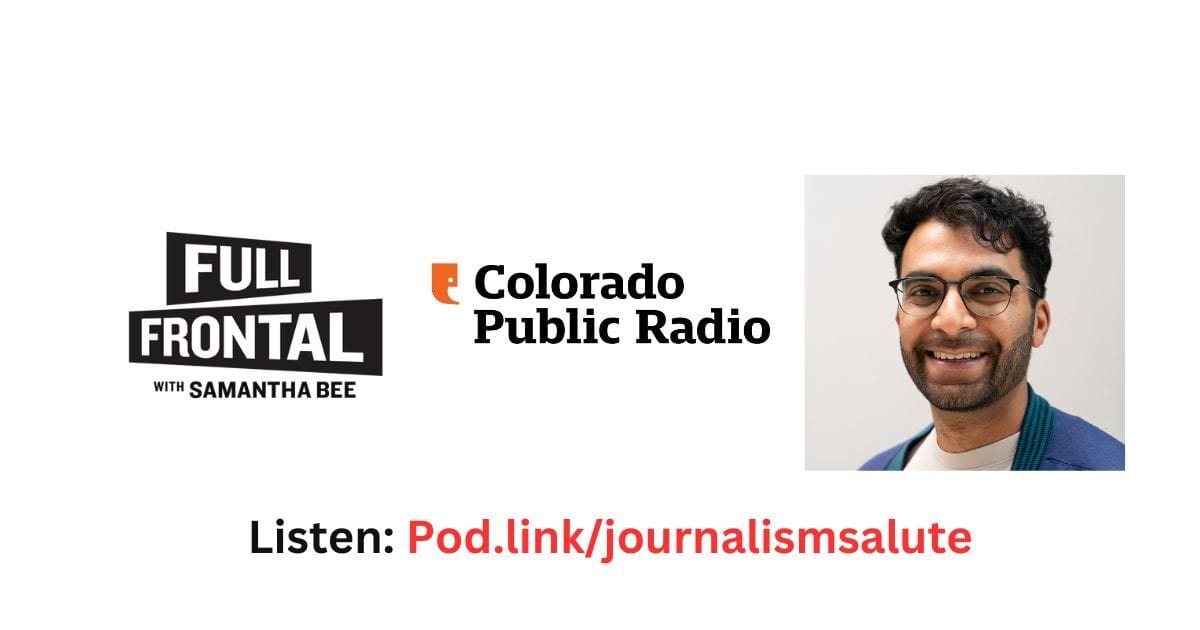I’m Luke DiStefano and I’ll be helping Mark with the newsletter for a while. I’m a student at The College of New Jersey majoring in Journalism & Professional Writing, with a minor in Creative Writing. Outside of this newsletter, I am the Nation & World editor at The Signal newspaper, and I am a published poet—with my poetry collection “the gentlemen gallery” available on Amazon.
On this episode of The Journalism Salute, Mark Simon spoke to Ishan Thakore. Ishan is a climate and environmental reporter for Colorado Public Radio, and was formerly a researcher, fact checker and field associate producer for Full Frontal with Samantha Bee, a show that used comedy to tell and analyze breaking news stories. That’s how he got his start.
“So Full Frontal with Samantha Bee was this once a week topical comedy show that was divided into three acts. And basically the idea was to do a rundown of current events and news, but distinctly with Sam’s perspective and the couple correspondences who worked on the show,” he said.
Ishan’s tasks included fact checking scripts, doing lookups for producers and on-air talent, create background documents for the production crew to read, pitching story ideas, and coordinating the logistics of remote shoots.
One thing I find particularly interesting about Ishan’s unique journalistic genesis is his perception of how, much like journalism, comedy has its own hard code of ethics that one must grapple with, especially in the case of the show where one is attempting to marry the two. His time within an environment where both were equal priorities has colored his views on this matter in a way I find really compelling.
“There was this thing we had talked about, try not to punch down,” he said. “Not always, but generally try to make your segment or something say something and assign some responsibility to whoever was perpetuating a bad policy that was affecting people, while also making it entertaining.”
Ishan’s journalism origin story illuminates an often overlooked elitism that journalism can sometimes have. There was a time that the few papers around that were able to print editions on a regular basis essentially had a monopoly over journalism, simply because there were no other avenues to do so. The technology simply hadn’t progressed far enough yet.
While many argue that the standards these few papers were able to hold the entirety of journalism to, by proxy of them simply being the entirety of journalism, was a golden age of sorts—I think that is remiss of the many ways journalism has adapted within our time to make use of the newfound mediums everyday people have at their disposal.
Journalism doesn’t really require a degree or familial background in the field. In fact, it can be argued that journalism is more an action or state of mind than a specific job. Take Ishan’s work with the show for example.
If it helped someone be informed on a topic they otherwise wouldn’t be, what does it matter the medium through which people receive their news? If it’s truthful, and it informs an audience, what truly isn't journalistic about it?
Ishan’s salute: The Committee to Protect Journalists and The Society for Environmental Journalists.
-Luke DiStefano
Hi, it’s Mark. A little follow-up from me … Thank you Nieman Lab for drawing my attention to a recent study in the Journal of Broadcasting and Electronic Media that relates to this week's guest.
The study was of the popular HBO show Last Week Tonight with John Oliver and found that people responded well and paid better attention to facts shared immediately after the telling of a joke.
Ishan talked about this and explained that thinking beyond the idea of 'ha-ha funny' was key to generating story ideas that could then be executed to draw attention to the situation and could enact positive change.
"If you can point out the absurdity of something, you can really find a story," he said.
Admittedly there's straddling of the definition of journalism, as you’ll hear Ishan provide one example of bringing attention to the absurdity of some situations that resulted in an unusual job duty - unpacking beds.
There’s much more to Ishan’s story (specifically his current job with Colorado Public Radio). Be sure to listen to the episode to learn more about him and his unusual career path.
A thank you as well to a former guest, Sonner Kehrt, who knows Ishan and suggested him as a guest after I put out a call on LinkedIn (follow the podcast!) asking if any of my followers knew someone who worked on a comedy news show. Thanks, Sonner!
If you have a suggestion for a guest, feel free to share it. You can e-mail me at [email protected]. Among the areas in which I'm looking for guest suggestions – those journalists covering video games and journalists doing their reporting on Instagram or TikTok.
-Mark Simon


